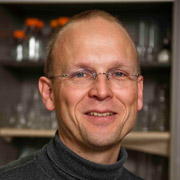Marching to his own beat
By Alisa Kim
It was supposed to be a two-maybe three-year stint.
That was how long Dr. Urban Emmenegger had planned to stay in Toronto to do his postdoctoral training in the lab of Sunnybrook Research Institute (SRI) senior scientist Dr. Robert Kerbel. In 2001, Emmenegger moved from Switzerland to work with Kerbel because of his pioneering research on antiangiogenic therapies. These are treatments designed to block the growth of blood vessels that feed cancerous tumours.
Fast-forward nine years: Emmenegger is a scientist in molecular and cellular biology at SRI and an oncologist at Sunnybrook's Odette Cancer Centre. He is also an assistant professor in the department of medicine at the University of Toronto.
"Dr. Kerbel is one of the reasons why I finished up in Canada," says Emmenegger of his move to SRI. "It was a good decision. Initially we didn't plan to stay, but it got longer and longer; the kids were born here and are now in school here. It's very unlikely that we'll go back."
With his roots in Toronto growing deeper, Emmenegger's dual role at Sunnybrook has been recognized with a Prostate Cancer Canada Clinician Scientist Award, worth $300,000 over two years.
The award will support Emmenegger's research on the use of metronomic chemotherapy, a form of antiangiogenic therapy, to treat prostate cancer. Metronomic chemotherapy is a treatment strategy that involves long-term administration of low doses of chemotherapeutic drugs with few or no breaks. This approach contrasts sharply with conventional chemotherapy, whereby patients receive high doses of chemotherapeutic drugs followed by rest periods to enable recovery from the therapy's harmful side effects.
Emmenegger's research is informed by his clinical work. He treats men with castration-resistant prostate cancer, a form of the disease in which cancer cells have become resistant to testosterone-deprivation therapy.
Metronomic chemotherapy may be a more suitable option for these patients than conventional chemotherapy. "The majority of prostate cancer patients are elderly men who often have cardiac risk factors or other diseases such as diabetes. Their tolerance of normal doses of chemotherapy might be limited," he says.
Even though metronomic chemotherapy is less toxic than its conventional counterpart, some patients fail to respond to such treatment or can develop resistance to it. Emmenegger seeks to uncover the mechanisms of resistance by comparing tumours that are sensitive to metronomic chemotherapy to those that are unresponsive to it. He is looking for markers that can predict responses to the therapy to be able to identify those patients who would benefit most from the treatment and to devise ways of overcoming resistance. For example, one way of countering resistance may be to sensitize patients to the treatment through the use of additional drugs.
Like many of his colleagues, a major challenge Emmenegger faces in his research is obtaining support. The harsh funding climate has more researchers vying for fewer dollars. Moreover, says Emmenegger, since metronomic chemotherapy is a different way of using drugs that are already approved, pharmaceutical companies are less inclined to fund clinical trials to validate the therapy.
His grant from Prostate Cancer Canada is
therefore significant in advancing this research, he says: "This award is quite
crucial. It really came at the right time."






